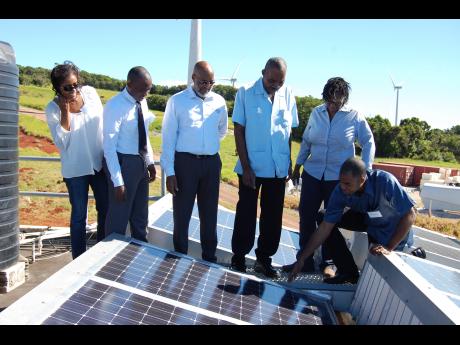Engineers’ Angle | Ramping up renewable energy - Electric vehicles could help Jamaica meet 2030 target
The recent announcement by Prime Minister Andrew Holness to generate 50 per cent of Jamaica's electricity needs from renewable sources by 2030 is very hopeful.
The announcement has raised a few eyebrows, with persons questioning the Government's commitment to this goal. To achieve the prime minister's target is not just a matter of buying and installing the renewable energy (RE) equipment, which is significant, it is also a matter of having the infrastructure to adequately support the inclusion of this power on the grid.
RE sources like, wind and the sun are not always available. While we can predict their availability to some extent, sudden weather changes and unexplained weather events do occur, which can cause a rapid shift in the power system's output. If the grid is not appropriately designed with storage, backup capacity, or quick-starting power systems to react to the shortfall in power production, then the grid can become unstable.
Another issue is that solar and wind energy are not always available when you need the power most. The sun, for example, is only available in the day. If we should install significant solar-power systems like photovoltaic (PV) panels on the grid, sometimes the power produced might be more than needed.
There must be a careful balance of power use and power production. We may likely be required to change our behaviour to use the RE when available, which is where our commitment will be tested.
The Government's commitment will be underscored by the supporting initiatives and polices. So, what will be required?
When you have more power being produced than is needed, that power can either be stored or wasted. In recent years, many large-scale storage options have been investigated, such as pump storage and grid-scale battery banks.
Electric vehicles (EVs), with their batteries, offer an opportunity that can be exploited to support the integration of more RE on the grid.
Plug-in EVs offer an opportunity that is both practical and economic. The cars already exist in the market space and have been there for some time now. They are well developed, and the technology is reliable. Electric cars can be charged at any time, night or day. But, most important, we can charge them in the daytime, when the solar system is producing its maximum output, or even at nights, when wind energy is available and the extent of its use is inconsequential.
This can be done with smart-charging technology at your workplace, in parking lots, or in your home. Smart chargers can determine the best time to charge based on your schedule and available power.
But what other opportunities do electric cars offer, and how do they compare to their fuel-burning counterparts? According to the US's energy.gov website, electric vehicles are being very responsive and have very good torque, are cheaper to operate, and can reduce the emissions that contribute to climate change and smog, therefore improving public health and reducing ecological damage.
However they tend to be more expensive, and some persons are still concerned about range and access to charging stations.
In Jamaica, when we eventually charge our energy vehicles on non-polluting renewable energy such as solar or wind, we are further reducing harmful emissions.
Therefore, electric vehicles offer an opportunity to improve Jamaica's energy security by using locally available sources of renewable energy. This strategy will tremendously assist in our efforts to decarbonise our transportation industry, which is the next logical step.
But before we can talk about these cars, we must be able to get them here. Again, this is where the Government's commitment comes into focus. A check of the Jamaica Customs website (jacustoms.gov.jm) shows that electric vehicles attract an aggregate duty rate of 52 per cent for individuals and 58 per cent for dealers.
To encourage the use of these vehicles, which offer such tremendous opportunities for implementation of RE technology, the Government should consider removing the duty to ensure that motorists can readily afford to replace their gasolene cars with electric alternatives if they choose.
The Government must create the environment for growth in the energy sector. Electric vehicles provide just one opportunity that can be exploited in a society where there is a growing dependence on renewable energy.
- Kirkland Rowe is a senior lecturer in the Mechanical Engineering Department at the University of Technology, Jamaica. Send questions and comments to editorial@gleanerjm.com or jie@cwjamaica.com. You may also leave comments for the Jamaica Institute of Engineer's Technical Committee on their Facebook page: Jamaica Institution of Engineers JIE.




